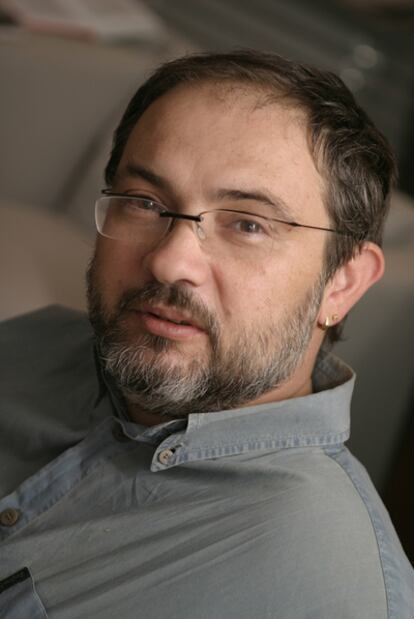"Guggenheim produces cultural McDonald's"
The provincial city of Perm claims its title as the hub of Russian art in Spain
Perm is a center for military industry in the Ural mountains, located in the heart of Russia. It's also is a perfect example of a provincial city that is struggling to reinvent itself as a cultural and artistic hub with international pretensions. The mainstay of this experiment is the Perm Modern Art Museum (PERMM), based on an idea by a provincial senator and carried out by gallery owner Marat Guelman.
PERMM's first exhibition focused on Russia's own Arte Povera movement. The institution is housed in a former river station on the banks of the Kama. The building, which is still in need of far-reaching renovations, stands out like a warm body among the snowdrifts piling up throughout the city.
"In Perm, culture has become a vector for development that propels the city forward"
The gallery's February program features an international exhibition on modern abstraction and a retrospective on "Sinie Nosi" (Blue Noses) that includes nearly all the movies made by this collective between 1999 and 2009. The ample facilities house a design center directed by Artemy Lebedev, as well as PERMM.
Perm officials no doubt had the success of Bilbao in mind. The port city in the Basque Country became an international tourist center following the opening of the Guggenheim Museum. Perm's authorities failed in their bid to become another Guggenheim city, but they proclaimed Perm cultural capital of Russia nevertheless.
"PERMM is the mainstay of the city's transformation and modernization program," says Guelman, who is also a member of the Social Chamber, an advisory body that helps establish Russia's cultural policies. The museum has launched a public art program that filled the streets with controversial sculptures and murals. Graffiti covers the walls of construction sites and has extended, apparently in a spontaneous way, to other buildings, as though citizens had taken a sudden liking to drawing on walls. Perm hosts some 15 art festivals, owns a unique collection of wooden sculptures and has developed a logo based on the "P" in Perm (in its Greek alphabet form), colored red. Designer bus shelters and a unified typography for all public signs are part of the plan to gain recognition on the world stage.
"In Perm, culture has become a vector for development that propels the city forward," says Guelman, who believes that cultural projects are reducing emigration from the city, because people are starting to like living here. Yet Perm, where unemployment is barely more than two percent, has yet to reach a million inhabitants.
In order to have time for the museum, Guelman has sold his share in the Moscow gallery that bears his name (now run by his wife.) He asserts that Russian cities are lining up to ask him to repeat for them what he has done for Perm, which is to say, bestow them with an identity that will enable them to compete with other urban centers. To this end, Guelman has created a special organization called Cultural Alliance and visited the city of Tver, where he plans to create a cultural buzz around an old paper factory. Tver is home to 30 percent of Russia's polygraph and publishing industry, and could become a printing center for the entire country. But Guelman holds that the idea of a network to give Russian cities a profile of their own is "the anti-McDonald's concept, because each city is going to be different. The Guggenheim produces cultural McDonald's."
In his mind, "the territory is a piece of dough that can be shaped to one's liking, and the country is an organism where each organ has a role to play. I help cities discover their own face."

Tu suscripción se está usando en otro dispositivo
¿Quieres añadir otro usuario a tu suscripción?
Si continúas leyendo en este dispositivo, no se podrá leer en el otro.
FlechaTu suscripción se está usando en otro dispositivo y solo puedes acceder a EL PAÍS desde un dispositivo a la vez.
Si quieres compartir tu cuenta, cambia tu suscripción a la modalidad Premium, así podrás añadir otro usuario. Cada uno accederá con su propia cuenta de email, lo que os permitirá personalizar vuestra experiencia en EL PAÍS.
¿Tienes una suscripción de empresa? Accede aquí para contratar más cuentas.
En el caso de no saber quién está usando tu cuenta, te recomendamos cambiar tu contraseña aquí.
Si decides continuar compartiendo tu cuenta, este mensaje se mostrará en tu dispositivo y en el de la otra persona que está usando tu cuenta de forma indefinida, afectando a tu experiencia de lectura. Puedes consultar aquí los términos y condiciones de la suscripción digital.








































